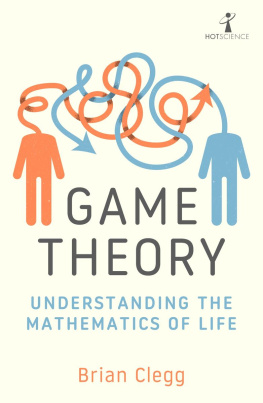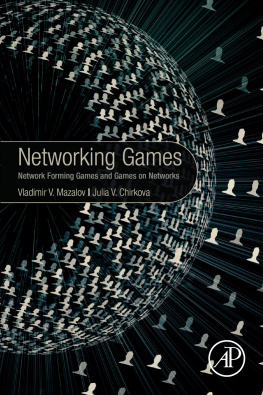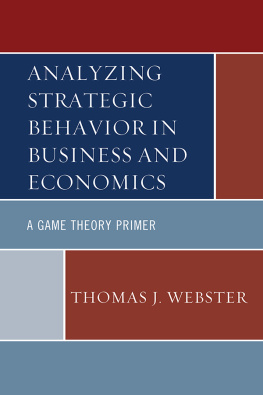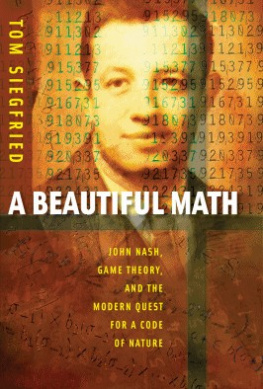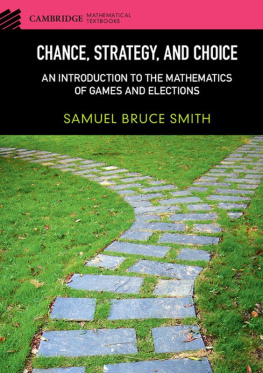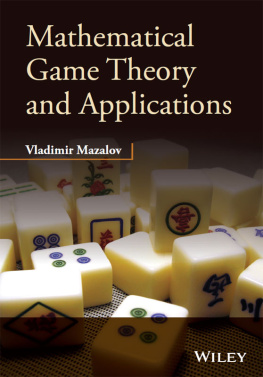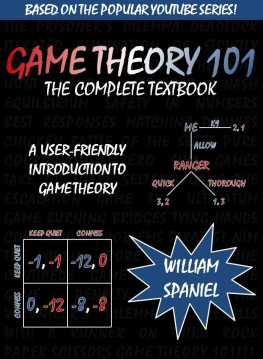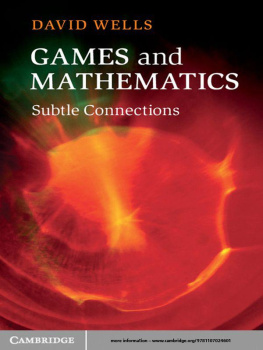THE LANGUAGE OF
GAME THEORY
Putting Epistemics into the
Mathematics of Games
World Scientific Series in Economic Theory
(ISSN: 2251-2071)
Series Editor: Eric Maskin (Harvard University, USA)
Published
| Vol. 1 | Equality of Opportunity: The Economics of Responsibility
by Marc Fleurbaey and Franois Maniquet |
| Vol. 2 | Robust Mechanism Design: The Role of Private Information and Higher Order Beliefs
Dirk Bergemann and Stephen Morris |
| Vol. 3 | Case-Based Predictions: An Axiomatic Approach to Prediction, Classification and Statistical Learning
Itzhak Gilboa and David Schmeidler |
| Vol. 4 | Simple Adaptive Strategies: From Regret-Matching to Uncoupled Dynamics
Sergiu Hart and Andreu Mas-Colell |
| Vol. 5 | The Language of Game Theory: Putting Epistemics into the Mathematics of Games
Adam Brandenburger |
Forthcoming
Uncertainty within Economic Models
Lars Peter Hansen (University of Chicago, USA) &
Thomas Sargent (New York University, USA)
Decision Theory
Wolfgang Pesendorfer (Princeton University, USA) &
Faruk Gul (Princeton University, USA)
Leverage and Default
John Geanakoplos (Yale University, USA)
Leverage Cycle, Equilibrium and Default
Vol. 2: Collateral Equilibrium and Default
John Geanakoplos (Yale University, USA)
Learning and Dynamic Games
Dirk Bergemann (Yale University, USA) & Juuso Valimaki (Aalto University, Finland)
World Scientific Series in Economic Theory Vol. 5
THE LANGUAGE OF
GAME THEORY
Putting Epistemics into the
Mathematics of Games
Adam Brandenburger
New York University, USA

Published by
World Scientific Publishing Co. Pte. Ltd.
5 Toh Tuck Link, Singapore 596224
USA office: 27 Warren Street, Suite 401-402, Hackensack, NJ 07601
UK office: 57 Shelton Street, Covent Garden, London WC2H 9HE
Library of Congress Cataloging-in-Publication Data
The language of game theory : putting epistemics into the mathematics of games / by Adam Brandenburger (New York University, USA).
pages cm. -- (World scientific series in economic theory, ISSN 2251-2071 ; vol. 5)
Includes bibliographical references and index.
ISBN 978-9814513432 -- ISBN 9814513431
1. Game theory. I. Brandenburger, Adam.
HB144.L36 2014
519.3--dc23
2013038870
British Library Cataloguing-in-Publication Data
A catalogue record for this book is available from the British Library.
Copyright 2014 by World Scientific Publishing Co. Pte. Ltd.
All rights reserved. This book, or parts thereof, may not be reproduced in any form or by any means, electronic or mechanical, including photocopying, recording or any information storage and retrieval system now known or to be invented, without written permission from the publisher.
For photocopying of material in this volume, please pay a copying fee through the Copyright Clearance Center, Inc., 222 Rosewood Drive, Danvers, MA 01923, USA. In this case permission to photocopy is not required from the publisher.
In-house Editor: Alisha Nguyen
Typeset by Stallion Press
Email:
Printed in Singapore
Over the past decade epistemic game theory has emerged as one of the principled alternatives to more traditional approaches to economic interactions and Adam Brandenburger has played a central role in that emergence. For anyone interested in epistemic game theory, or game theory in general, this book is a must have. But even more important is the opportunity this volume, and epistemic game theory in general, presents to empirical scientists. As Brandenburger notes in his Introduction, until now epistemic game theory has been a theoretical discipline. This volume should make it clear, however, that it could be and likely soon will be an empirical undertaking. Anyone interested in behavioral, psychological, or neurobiological studies of how we make decisions during strategic play will find in this volume a profoundly fascinating set of empirically testable hypotheses just waiting to be examined.
Paul Glimcher
New York University, USA
Adam Brandenburger has played a leading role in developing the program of epistemic game theory, the goal of which is to provide a deeper and clearer foundation for game theory as a whole. This volume collects a remarkable body of work by Brandenburger and his collaborators, in which penetrating conceptual analysis and the development of a rich mathematical theory go hand in hand. The work offers much of great interest to computer scientists, who will see many connections with their study of recursive and corecursive structures, of processes and their logics, and of multi-agent systems; and to mathematicians and logicians interested in making precise models of the reflexive structures inherent in systems containing rational agents who can reason about the system of which they form a part. I hope that this timely collection will help to stimulate cross-disciplinary work on these fundamental topics.
Samson Abramsky
Oxford University, UK
Games are playgrounds where players meet and interact, guided by streams of information and opinion. Adam Brandenburgers work has been instrumental in creating a new rich epistemic framework doing justice to both games and their players. This timely book will help a broader audience learn and appreciate the resulting theory.
Johan van Benthem
University of Amsterdam, The Netherlands Stanford University, USA
Economics, so grounded in the notion of equilibrium, has required substantial foundational work on reasoning about reasoning epistemics in interacting situations (games). Yet, if plain reasoning is difficult enough, just imagine epistemics. Adam Brandenburger, as is evident from the elegant and clear chapters of this book, is a master of the trade. His highly regarded research, always subtle and deep, is of the kind that establishes milestones while at the same time opening up vistas to new, and unexpected, frontiers. This book is specialized, certainly, but it is a must.
Andreu Mas-Colell
Universitat Pompeu Fabra, Spain
To my daughter
Lucy Brandenburger
12 years old and who happily explained epistemic game theory to me while we were playing cards one day.
Adam: Lucy, hold up your cards. I can see your hand.
Lucy: Dad, it doesnt matter if you see my cards. You dont know my strategy.
To my late mother
Ennis Brandenburger
who passed on to me her love of language in all its forms.
And to my wife
Barbara Rifkind
my beloved partner in the game of life.
Foreword
Game theory attempts to predict how agents (people, firms, governments, etc.) will behave in strategic situations. And far-and-away the most important predictive concept in game theorys evolution has been Nash equilibrium, a configuration of strategies from which no agent gets a higher payoff by deviating unilaterally.
On the face of it, Nash equilibrium seems a plausible prediction: why, after all, would a rational agent
Next page


